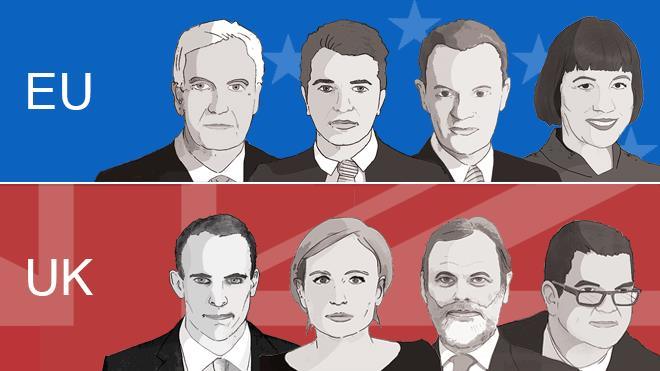EU leaders react as UK PM Theresa May officially triggers Brexit
- Published
Donald Tusk said the EU's aim was "damage limitation"
"After nine months the UK has delivered," declared EU Council President Donald Tusk in a portentous tweet on receipt of the letter triggering Brexit, external from Prime Minister Theresa May.
The tone of his speech in Brussels was full of regret. There was "no reason to pretend that this is a happy day" in Brussels or London, he added. "We already miss you."
Looking on the bright side, he said there was "also something positive" about Brexit as it had made the 27 states remaining in the EU more determined and united than before.
That mood of regret tinged with defiance was echoed by a tweet from European Parliament President Antonio Tajani:, external "Today isn't a good day. #Brexit marks a new chapter in our Union's history, but we're ready, we'll move on, hoping UK remains close partner."
He later spoke about the possibility of Britain reversing its decision, saying that all member states would have to support it.
European Commission President Jean-Claude Juncker, speaking in Malta, called it a "day of sadness".
French President Francois Hollande, meanwhile, said that while Brexit was "sentimentally painful" for Europe it would be "economically painful" for Britain,
But Mr Hollande also said there was no intention to "punish" Britain "for the principle".
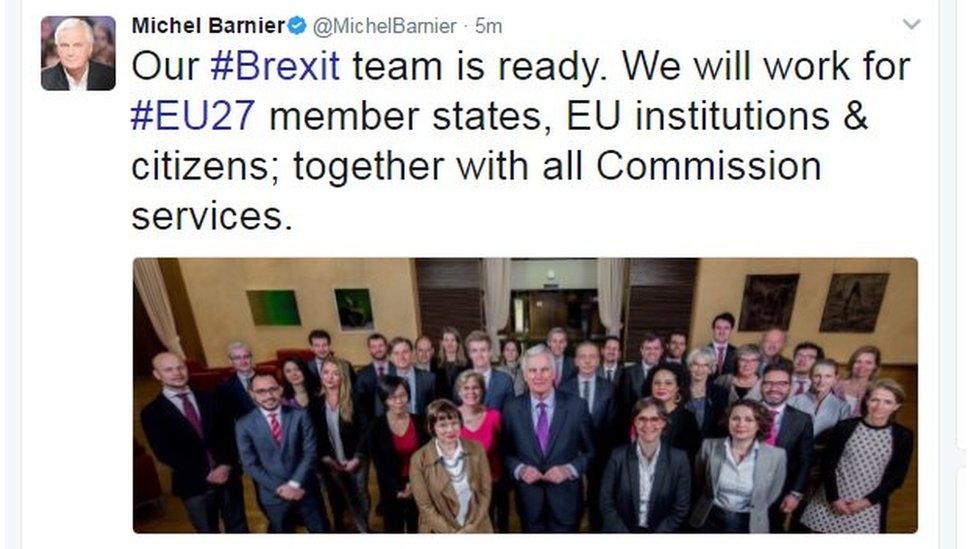
The EU's chief Brexit negotiator said his team was ready
"It will end with a trade agreement between Great Britain and Europe, we hope that it's the best trade agreement possible," he said during a visit to Indonesia.
In Berlin, German Chancellor Angela Merkel struck a pragmatic tone. She said Germany and other EU states "certainly didn't want this day to come, because we're losing a strong and important member state.
"But naturally we accept the democratic decision of the British voters," she added.
Mrs Merkel also said Britain's commitments to the EU had to be dismantled before talks could move on to the future relationship, in an apparent rejection of Mrs May's call for simultaneous discussions.
She also stressed the need to protect EU citizens living in Britain.
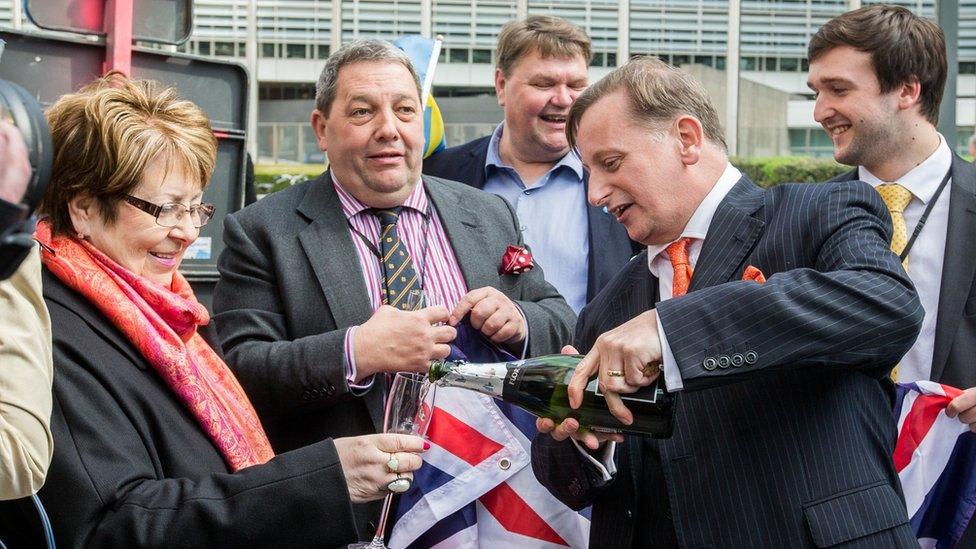
It was a day to pop champagne corks for UK Independence Party (UKIP) MEPs in Brussels
A more bitter response came from another leading German politician, Manfred Weber, chair of the centre-right EPP Group in the European Parliament.
Pointing the finger at British politicians who had campaigned for Brexit, he complained that they had had the chance to grow up in a free Europe but now they were erecting walls.
"EU has done everything to keep the British. From now on, only the interests of the remaining 440 million Europeans count for us," he tweeted, external.
Maltese Prime Minister Joseph Muscat expressed concern about the link made between a trade agreement and future security cooperation in Mrs May's letter.
"We are part of the same family," Mr Muscat said in Valletta, "we should be committed to fighting terrorism and beefing up our security irrespective of what happens at the end of the day."
French far-right MP Marion Maréchal-Le Pen had nothing but praise for the British move: "The British people have rediscovered their liberty," she tweeted, external, adding that her party, the National Front, would offer France its own go at independence.
Emmanuel Macron, the centrist French presidential candidate, said he believed Britain and the EU needed to maintain a close relationship, especially in defence.
He was speaking after meeting London Mayor Sadiq Khan and noted that some 200,000 French citizens live in the UK capital.
"Some of them will decide to come back, I will be very happy to host them again," he said in English. "But, obviously, we will work together with the UK and we will work together with London because they live there.''
'Can't have your cake and eat it'
Dutch Foreign Minister Bert Koenders was clear that Britain would not get a better deal outside the EU than inside the bloc.
He told the BBC he doesn't want a "fighting divorce" with the UK, but rather one "in which the bills are paid and our citizens are treated well".
However he added: "But you can't have your cake and eat it and I think the British government knows it."
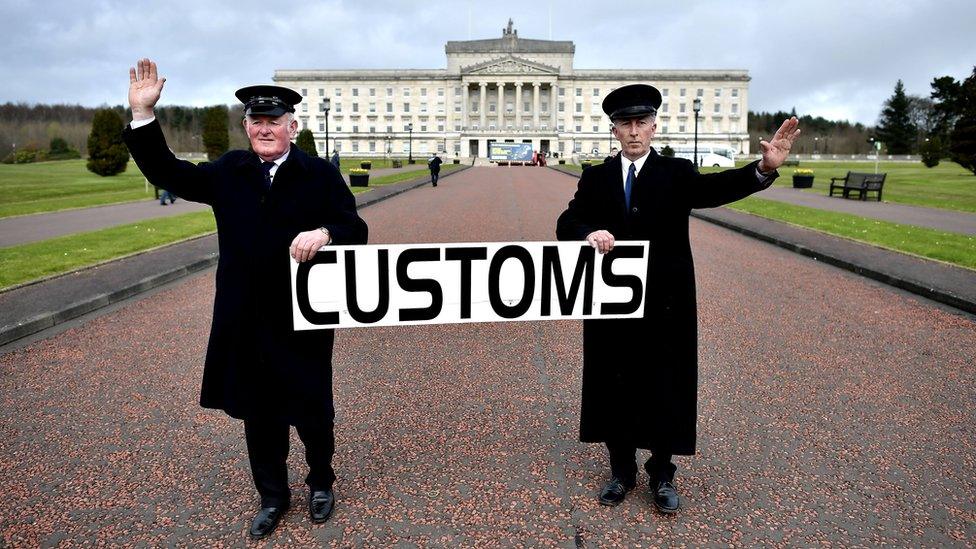
A protest outside Stormont, Northern Ireland's legislative assembly, against Brexit and its possible effect on the Irish border
In other reaction:
Spanish Prime Minister Mariano Rajoy said his priority was to minimise uncertainty for investors
Austrian Chancellor Christian Kern said clarifying the status and rights of 25,000 Austrians living in the UK was "at the forefront"
Portuguese President Marcelo Rebelo de Sousa said that Britain "would continue to be a European country, a fundamental pillar of peace and security on the Old Continent, and a cultural and economic reference for Europe and Europeans"
The Irish government said protecting the Northern Ireland peace process - including through maintaining an open border - and continuing the Common Travel Area with the UK were among its negotiating priorities

'Divorce hurts' - European press reaction, by BBC Monitoring
There was little optimism on show in Europe's newspapers as Brexit loomed.
"Divorce hurts," warned Germany's centre-right Frankfurter Allgemeine Zeitung over a photograph of Winston Churchill's brooding statue in Parliament Square.
Its economics correspondent Ralph Bollman warned that the loss to the EU of its third largest economy would "also weaken Germany's voice in the world". Overall, he believed a "highly-indebted Britain has the most to lose from uncertainty over a friendly deal with Brussels".
The headline for France's centre-left Le Monde was "The consequences of the break". While Theresa May started from a position of strength because of "the decay" of the opposition Labour Party, the UK faced "complex negotiations over expatriates, access to the single market, and control of borders".
Italy's Corriere della Sera said "Brexit is under way, but without walls": negotiations would set "no predetermined ceilings for EU migration, but rather decisions sector by sector".
For the London correspondent of Poland's Gazeta Wyborcza this was the start of a "journey into the unknown". Its focus was on the fate of Polish workers in the UK. Even its account of a possible second referendum on Scottish independence was headed with the question: "What does this mean for Polish immigrants?"

- Published28 March 2017
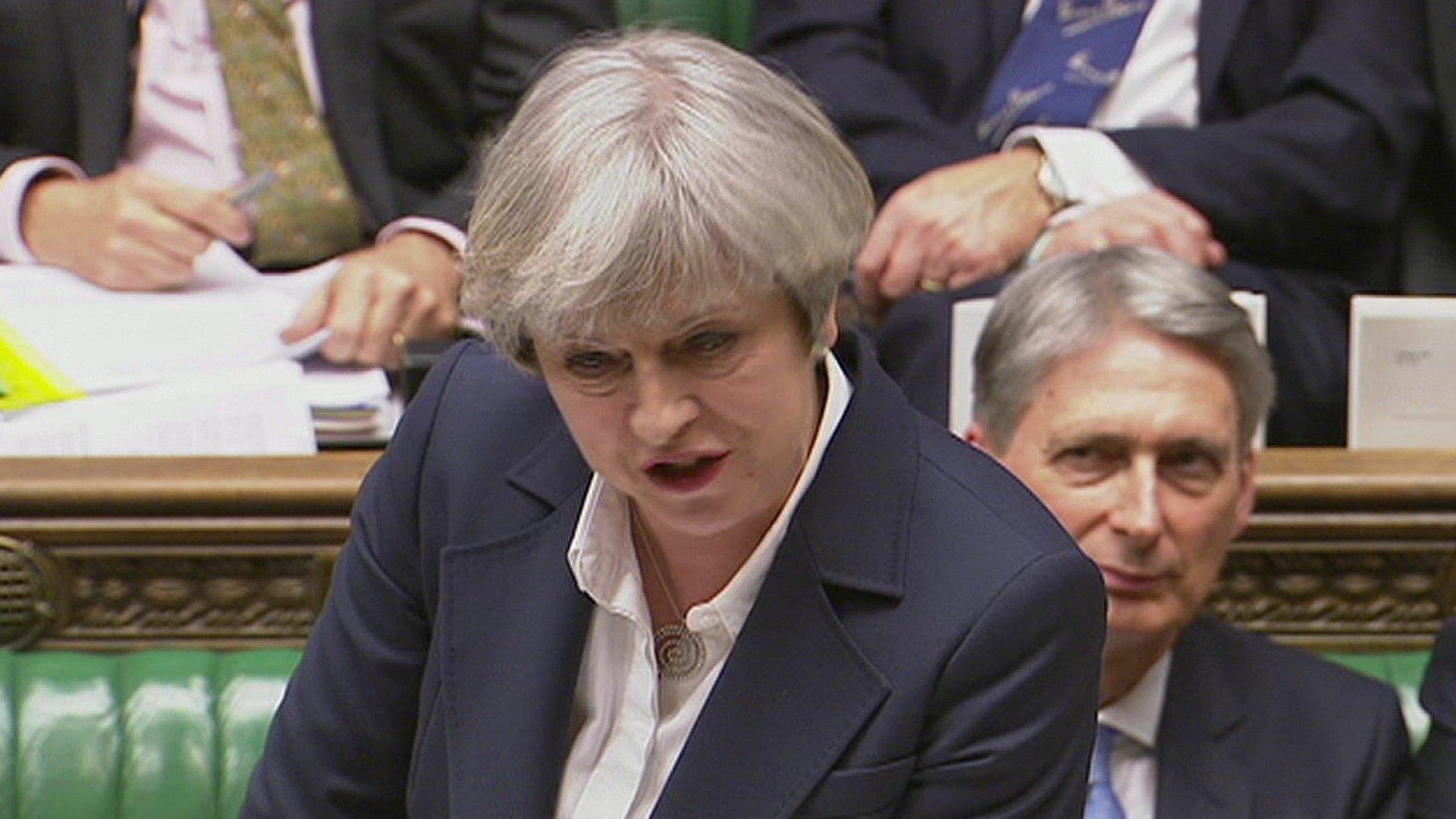
- Published29 March 2017
- Published29 March 2017
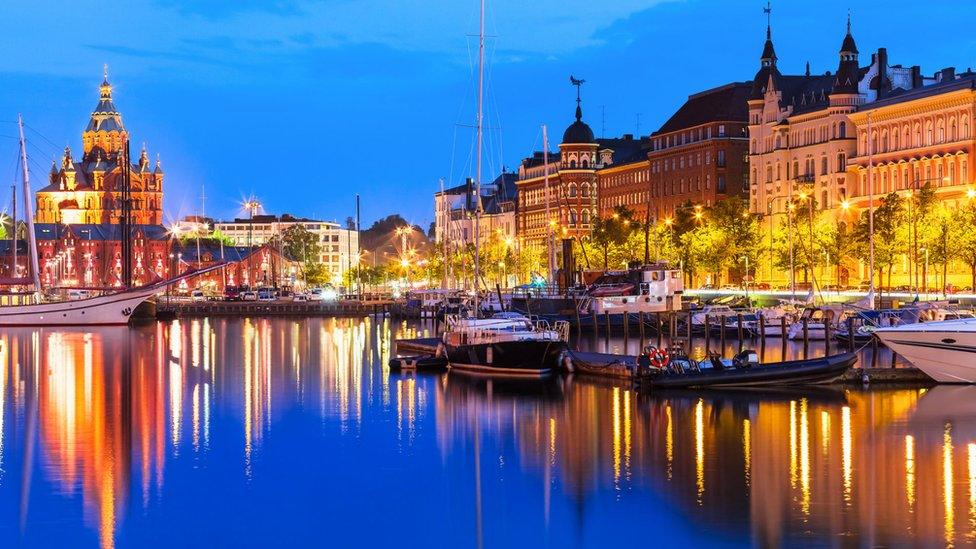
- Published29 March 2017
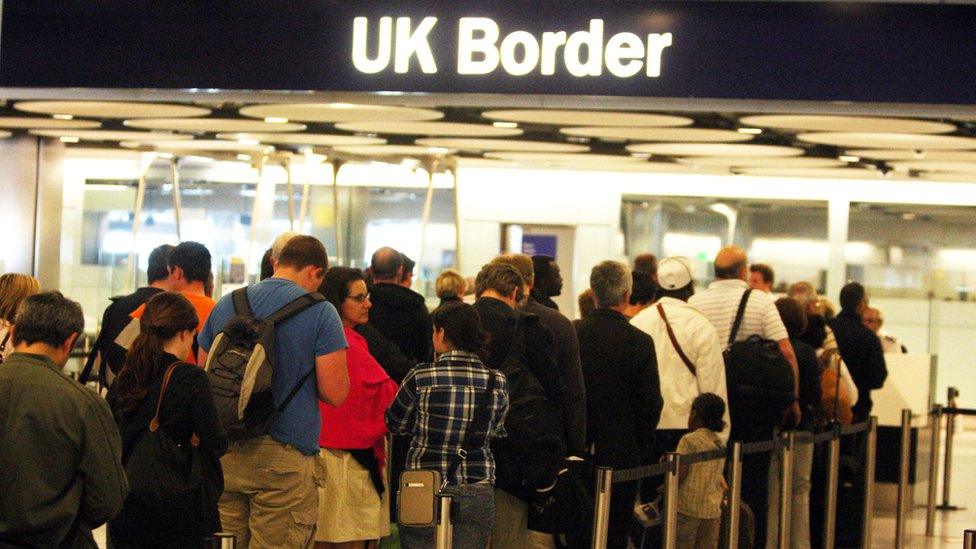
- Published30 March 2017
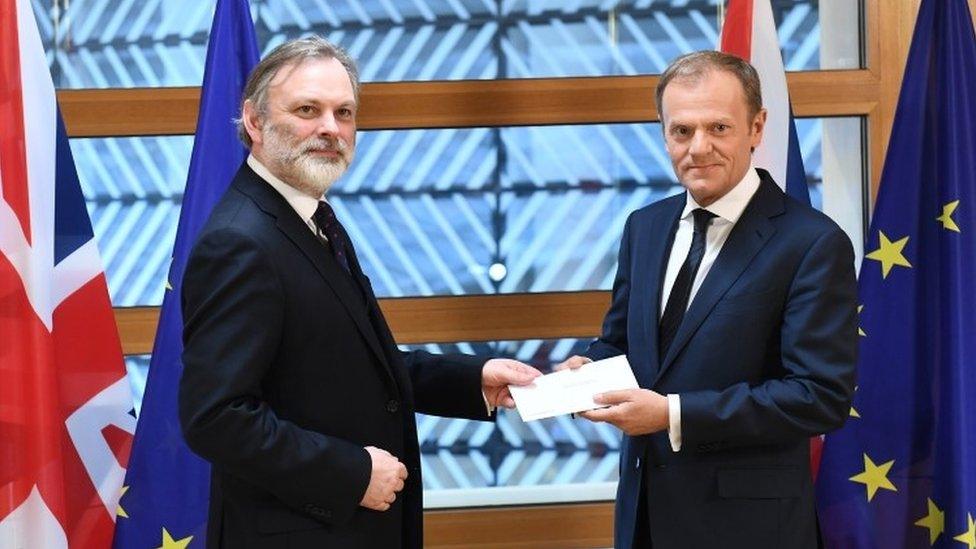
- Published17 November 2018
